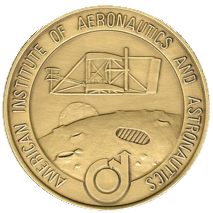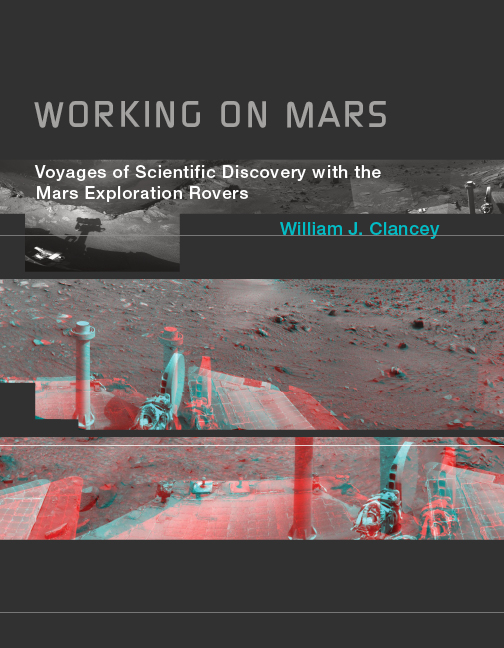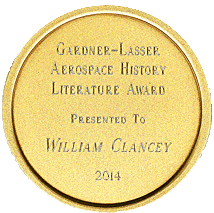





© MIT Press 2012
Geologists in the field climb hills and hang onto craggy outcrops; they put their fingers in sand and scratch, smell, and even taste rocks. Beginning in 2004, however, a team of geologists and other planetary scientists did field science in a dark room in Pasadena, exploring Mars from NASA’s Jet Propulsion Laboratory (JPL) by means of the remotely operated Mars Exploration Rovers (MER). Clustered around monitors, living on Mars time, painstakingly plotting each movement of the rovers and their tools, sensors, and cameras, these scientists reported that they felt as if they were on Mars themselves, doing field science. The MER created a virtual experience of being on Mars. In this book, William J. Clancey examines how the MER has changed the nature of planetary field science.
NASA cast the rovers, Spirit and Opportunity, as “robotic geologists,” and ascribed machine initiative (“Spirit collected additional imagery . . .”) to remotely controlled actions. Clancey argues that the actual explorers were not the rovers but the scientists, who imaginatively projected themselves into the body of the machine to conduct the first overland expedition of another planet. The scientists have since left the darkened room and work from different home bases, but the rover-enabled exploration of Mars continues. Drawing on his extensive observations of scientists in the field and at the JPL, Clancey investigates how the design of the rover mission enables field science on Mars, explaining how the scientists and rover engineers manipulate the vehicle and why the programmable tools and analytic instruments work so well for them. He shows how the scientists felt not as if they were issuing commands to a machine but rather as if they were working on the red planet, riding together in the rover on a voyage of discovery.
PREFACE
Origin of the study of the scientists’ practices and experience
Explicating how the MER exploration system enabled field science on Mars
Orienting to the scientific fieldwork occurring on Mars
1. SCIENTISTS WORKING ON MARS
Living with Spirit and Opportunity
The paradox of exploring with a rover
The paradox of the robotic geologist
Learning from MER by analyzing the scientists’ experience
2. MISSION ORIGIN AND ACCOMPLISHMENTS
Planetary surface missions
Inventing a mobile robotic laboratory
Campaigns and traverses
Mission timeline
3. A NEW KIND OF FIELD SCIENCE
Exploring a place scientifically
Analog research and operations tests
Fieldwork methods
Relation of laboratories and planetary science
Humboldtian science: systematic, quantitative, and integrative inquiry
Understanding science, discovery, and exploration
Distinguishing socio-historical and cognitive analyses of exploration
4. A NEW KIND OF SCIENTIFIC EXPLORATION SYSTEM
The MER exploration system
Telepresence through synergistic telerobotics
The development of daily commanding in MER surface operations
Justifying daily commanding for field science
How daily commanding enhanced scientific quality
5. THE MISSION SCIENTISTS
The Athena team and collaborating scientists
The project scientist and principal investigator roles
Progressive blending of identities
The allure of exploration
Culmination of a career
How does my expertise fit?
6. BEING THE ROVER: WE’RE ON MARS
The explorers’ language
The rover as a human body
Coordinating telerobotic inquiry: visualization and autonomy
“Robotic geologists”
What a field scientist could do in a few minutes
A consuming activity
7. THE COMMUNAL SCIENTIST
One instrument, one team
Being a textbook scientist
Field vs. Lab scientists: disciplinary conflict from pace
Designed collaboration: the science theme groups
Learning to work together during analog field experiments
Speaking the same language: the naming problem
Being a member of the science team
Losing the rovers means losing the team
It’s still a job, though you’re working on Mars
8. THE SCIENTIST ENGINEERS
An old class distinction
The engineers’ role
The SOWG room: the deck of the ship
Bridging the science–engineering gap
The engineers’ concern for science
Driving a vehicle in the testbed
The engineers’ problem-solving expertise
9. THE PERSONAL SCIENTIST
Private and public aspects of scientific identity
Personal projects
Straddling unfamiliar and familiar worlds
The public persona
Aesthetic experience: beautiful images and revered places
Emotional experiences
10. THE FUTURE OF PLANETARY SURFACE EXPLORATION
What we’ve learned: communal, public, virtual science
A combination of scientific practices
The developing practice of Mars exploration: a dynamic between the self and social- technological context
Organizing people and configuring robots
Exploring an entire planet: staffing, mobility, and strategy
Designing future field science technology for Mars
EPILOGUE
BIBLIOGRAPHIC ESSAY
The mission: Mars Exploration Rovers
Robotic systems and human-robotic interaction
Virtual presence and agency
Earlier space exploration missions
History of scientific exploration
The study of workplaces and scientific practice
GLOSSARY
INDEX
Purchase: approx $20 from Amazon (author does not receive royalties)